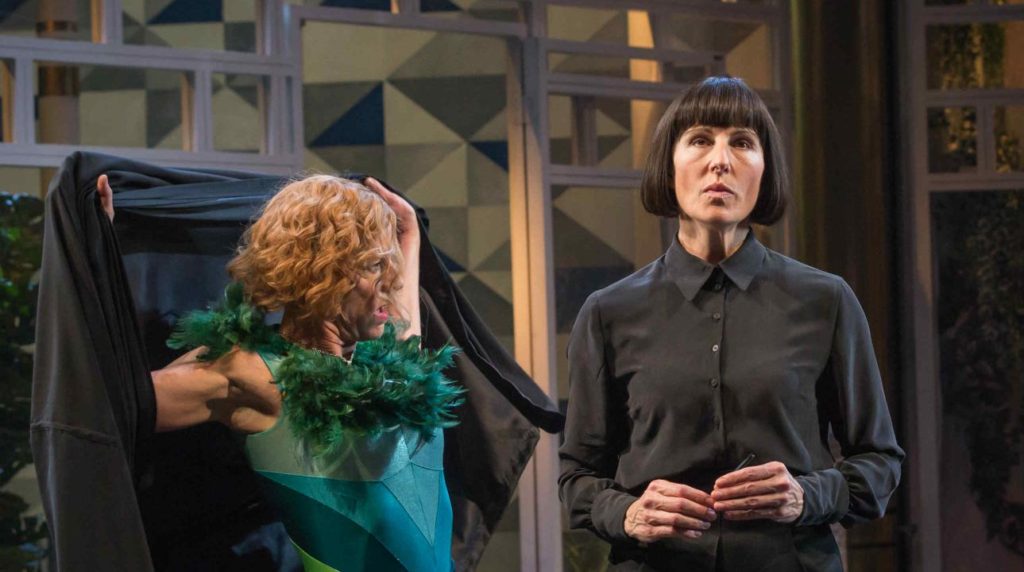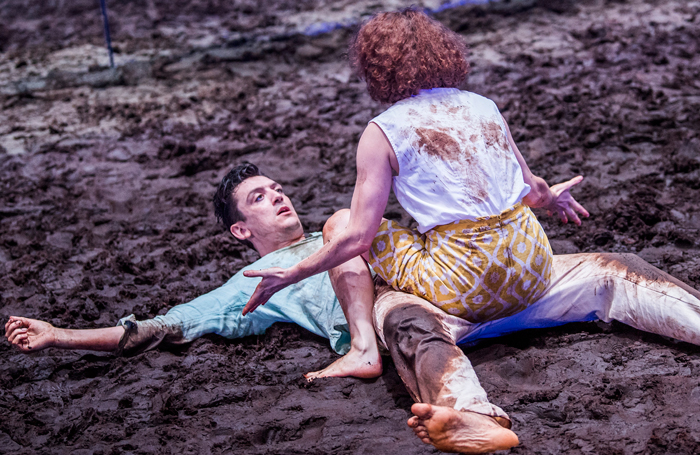What makes a comedy? Perspective. Ask Shakespeare’s Malvolia, Titania, or Andrew Aguecheek if they’re living in a comedy and they’ll gaze at you with tear-stained incredulity. Publicly shamed, sexually humiliated, drugged and tricked into – oh yes – public sex with a donkey. Oh, how they laugh.
Whether we laugh – or whether we’re encouraged to do so – depends on the production. Perhaps we should start from the position that Shakespeare’s comedies aren’t necessarily funny now – so what else might they be? After all, there can be a hilarity in plays by Caryl Churchill or Simon Stephens – but that’s not the only, or even the main point. A Shakespeare show aiming at funny or die just might die on its arse.
That’s why Joe Hill-Gibbins’ A Midsummer Night’s Dream hits home so forcefully. Feh to fairies and a romcom beneath the stars – pah even to the dazzlingly smart entertainment that Emma Rice created at the Globe last summer. At the Young Vic, the wood near Athens is where dream become nightmare. Johannes Schütz designs a muddy paddock and a mirror. The ground is claggy with clods – impossible to cross without stumbling whether in heels or bearefoot, ready to smear the nicest summer dress with dark beshitten stains.
There are guffaws here – confusion and despair, what’s not to laugh? – but they’re almost incidental. Unlike other dreams, this is less fantasia than a nightmare of identity. So many of these characters define themselves through the desire they feel or attract. Helena, rejected by her beloved, feels she’s been scrubbed out – Anna Madeley makes her a losing battle between incisive and plaintive. Michael Gould’s Oberon (like the duke in Hill-Gibbins’ Measure for Measure, a damaged manipulator), makes everything right and feels it’s all gone wrong. The lovers may end up in neat Jack-shall-have-Jill pairings, but can’t forget how they got there. The women, especially – Hermia (Jemima Rooper) has seen her Lysander as coercive (ignoring her protests against runaway sex for rather too long) and violently repudiating; the happy ending traumatises her.
The revelatory performance was Leo Bill as Bottom. He looks, a bit, like an exaggerated version of the director (auburn locks, big specs, hipster trews), and has a sweetness, an earnestness, blinking with enthusiasm and kindness. His transformation into ass is even more deforming than most – Sarah Lucas-style distended knobbly stockings at ears and around his crotch and torso. Yet his sweetness is undented – no wonder Titania (Anastasia Hille) falls for him, no wonder their finger-twirling caress seems like a reproach to Oberon. No wonder, too, that when Bottom meets Hille’s Hippolyta, a memory of their besotted avatars reawakens, shutting Gould out.
Some productions treat dawn as a blank slate; several reviews have noted that Robert Lepage (1992) also set the play in a mudbath – but his mucky lovers showered upon waking, their underwear gleaming white once more, the night’s terrors sluiced away. No such relief here – mud sticks, and can’t be scrubbed, claggy as disappointment, a permastain of humiliation.
Bill, in an interview, located the charge of Hill-Gibbins’ Measure for Measure in its ending: ‘it was the first time I’d seen it end really badly, with no jig, just really fucked up.’ Here too, the ending remains unconsoling: relationships have frayed too far for resolution. Less therapeutic dream than recurring nightmare, the production (cut text, two hours) ends with everyone repeating key lines, like wheels spinning in the mud. The voice of Oliver Alvin-Wilson’s derisive Demetrius rises above the gabble, asking over and over, ‘are you sure that we are awake?’ And that is a frightened place to be.
Desire and disappointment
It’s the wahey bits that slap you with cringe in Simon Godwin’s production of Twelfth Night. Doon Mackichan’s jester – here, a cabaret artiste in Grayson Perry’s spangly cast-offs – has witty inflections and a voice for a rueful torch song – but hard though she works she can’t raise a titter. Godwin’s weakness for gigglesome shtick – car, teddy bear, naughty nightclub – rarely pays off.
Funny business just isn’t funny. Unhappiness and delusion, however, never lose their savour. The production’s genderquake talking point was Tamsin Greig, turning the steward who gets comeuppanced from puritanical killjoy Malvolio into lesbian puritanical killjoy Malvolia. It’s a genius move, but only because Greig is a comic genius who makes everything real. Malvolia’s is a world of tightly-wound desire and terrible disappointment. She’s a grim-lipped Mrs Danvers, stalking Olivia’s household in black culottes and a bob trimmed so precisely you could cut yourself on it. Her long hands slice the air with samurai precision. Her mouth curdles with contempt. Her smile spreads frost before it, but her fingers stretch out, millicreep by millicreep, towards the sleeping Olivia’s hair.
But she wants so much, this Malvolia – and it’s hard not to feel for her because don’t we want too much as well? Would we bother with theatre if we weren’t swaddled in unrealistic dreams, wanting to escape them or watch them acted out? She dreams big, Malvolia: social ambition with a side order of hot countess sex. Her discovery of the fake-news love letter that ruins her is crying-funny, because she ushers us into her confidence. She adjusts some wayward topiary – shocked that we’ve let it pass – then exults. She doesn’t entirely trust us – she’s bitterly disappointed when we snigger at a double entendre – but she has to confide in someone, and we’re the best she’s got. Still, we’re not enough – not enough to warn her against dressing as a cutie-pie pierrot in canary yellow, nor to advise against the novelty nipple windmills, nor save her from the terror of the madhouise or the indignity of public exposure. When Greig, pale with shame and fury, vows ‘I’ll be revenged on the whole pack of you,’ it’s us she addresses. We’ve let her down. We shared her dreams and let them die. Are we laughing? We should be ashamed of ourselves.
Photo (top) of Doon Mackichan and Tamsin Greig, by Marc Brennan
Follow David on Twitter – @mrdavidjays



Leave a Reply